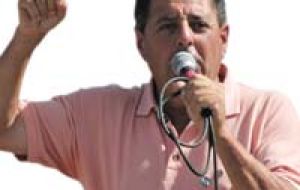MercoPress. South Atlantic News Agency
Argentine farmers half-mobilized extend truce to Wednesday
 Farmer De Angeli become a media icon of the protest
Farmer De Angeli become a media icon of the protest Argentine farmers will limit sales of agricultural products in a renewed protest against a sliding tax system for grain and oilseed exports, but they will continue to negotiate with the government, farm leaders announced Friday after consulting with their organizations
Argentina's farmers lifted a three-week strike on April 2 and agreed to spend the month in talks with the government. However, the negotiations produced few agreements, leading them to announce new measures as the 30-day truce ended Friday May 2. "The (agricultural) trade will be subject to purchases and sales of what is strictly necessary, simply because the situation is not clear" Eduardo Buzzi, head of the Argentine Agricultural Federation (FAA), told a press conference alongside other strike leaders. He did not give details but the Carbap farming group said in a statement farmers would "buy only the essentials and sell as little as possible ... to pay costs and get by". Argentina is one of the world's top suppliers of soy, corn, wheat and beef, and March's lockout disrupted crucial grain shipments. It also landed the administration of President Cristina Kirchner with her toughest challenge since taking office in December as farmers blocked roads to stop farm goods reaching market, a measure that caused shortages of beef and dairy products in cities. But farm leaders have over recent days ruled out a repeat of the roadblocks, saying farmers did not want ordinary Argentines to suffer. "We're going to be mobilized along the roads, with farm machinery, but we're not talking about roadblocks" Buzzi said on Friday. Toward the end of the truce, farm leaders reached partial agreements to normalize beef and wheat exports, but no agreement was reached on the higher soybean export duties that triggered the protest. That is due to be discussed again early next week. "On Tuesday, we will resume dialogue. There are no time limits (for negotiations), said Fernando Gioino, president of the Coninagro association. Buzzi said: "We hope that on Tuesday the few agreements there have been on beef and wheat are implemented." "The first item on Tuesday's agenda will be the higher soybean duties," said Argentine Rural Society leader Luciano Miguens. He also said that Argentina is currently exporting only 20% of the beef it produces and that domestic consumption has increased to 70 kilos per capita per annum from 50 kilos a few years ago. Farmers demand the rollback of the higher duties but the government has repeatedly said that it will not review its decision. The duty shake-up was the last straw for farmers, who had been angered by a string of government policies aimed at fighting inflation, such as price controls and repeated export restrictions on wheat, beef and dairy produce. Such measures are defended by the government as a way to redistribute the windfalls of soaring global food prices and keep down the cost of everyday staples in a country where about a quarter of the population lives in poverty. During the three week lockout farmers staged until April 2, Mrs. Kirchner accused producers of coup mongering. Farmers replied that the government was seeking to queer the pitch ahead of talks. The four farm organizations group around 100.000 producers each. Meantime one of the most vocal of farm protestors in the province of Entre Rios blocked one lane of highway 14, also known as the Mercosur highway since it connects Brazil with Argentina, to hold an assembly and decide steps to follows. Alfredo De Angeli who during the three weeks long strike become a media icon of the protest organized the assembly. Apparently it was decided that "all farmers will be out in Argentina's routes if there are no definitions on Tuesday", which is when a crucial meeting of farmers with the Argentine government has been scheduled. De Angeli's plain honesty and straightforwardness during the three weeks conflict rapidly made him a reference of the struggle in Argentina's national television which infuriated the Kirchner administration. Allegedly the media, particularly television, has been "suggested" by Kirchner administration officials to downplay or "avoid" giving footage or microphone to Mr. De Angelis. So imposing his figure as a reference of the conflict became that according to independent Argentine press sources De Angelis was scrutinized for a possible criminal record and the only thing he police could come up with was that the indebted farmer had once had found on a road side, close to his farm, a brief case with 30.000 US dollars, almost his debt with banks. However fro many surprised Argentines, he diligently looked for the owner and returned the money.




Top Comments
Disclaimer & comment rulesCommenting for this story is now closed.
If you have a Facebook account, become a fan and comment on our Facebook Page!